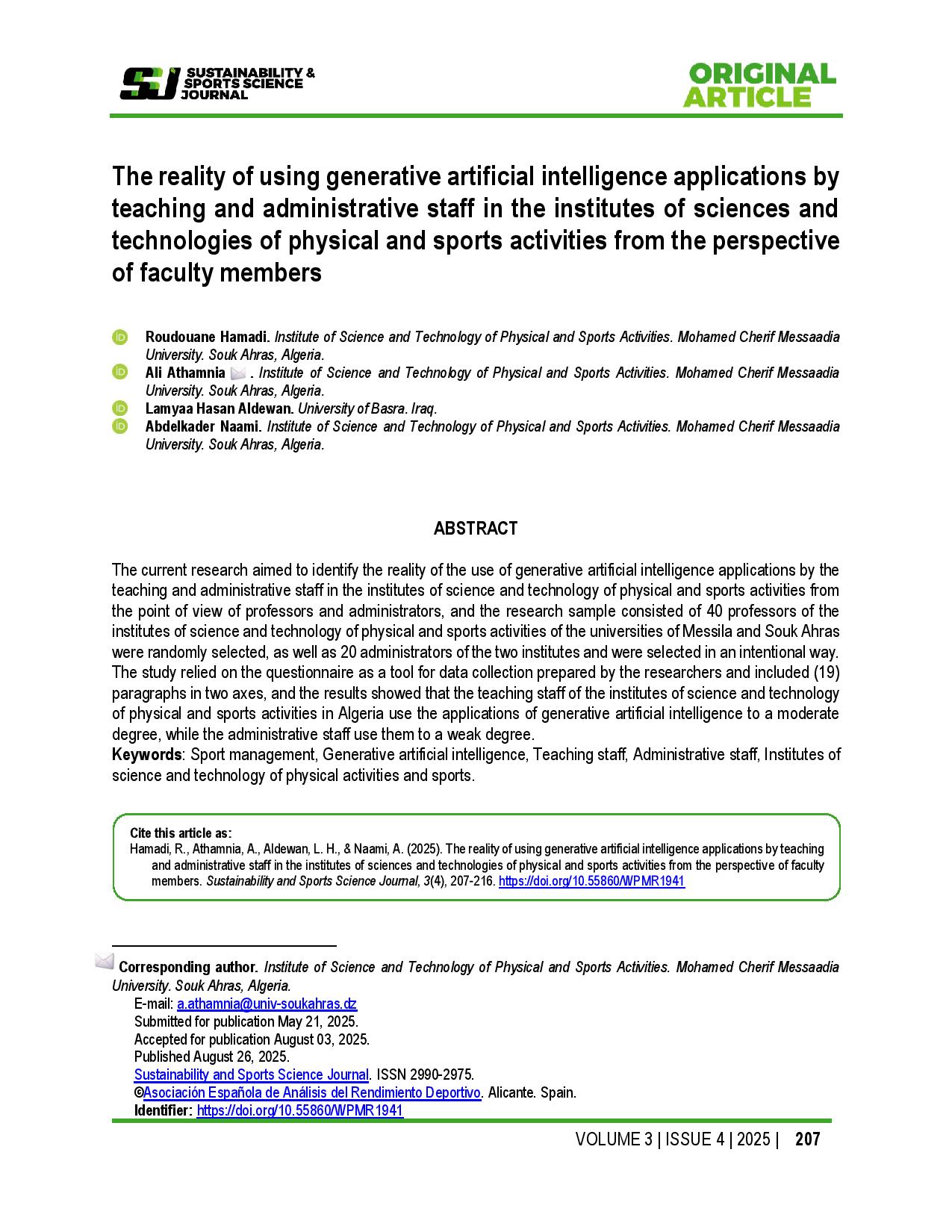The reality of using generative artificial intelligence applications by teaching and administrative staff in the institutes of sciences and technologies of physical and sports activities from the perspective of faculty members
Main Article Content
Abstract
The current research aimed to identify the reality of the use of generative artificial intelligence applications by the teaching and administrative staff in the institutes of science and technology of physical and sports activities from the point of view of professors and administrators, and the research sample consisted of 40 professors of the institutes of science and technology of physical and sports activities of the universities of Messila and Souk Ahras were randomly selected, as well as 20 administrators of the two institutes and were selected in an intentional way. The study relied on the questionnaire as a tool for data collection prepared by the researchers and included (19) paragraphs in two axes, and the results showed that the teaching staff of the institutes of science and technology of physical and sports activities in Algeria use the applications of generative artificial intelligence to a moderate degree, while the administrative staff use them to a weak degree.
Article Details

This work is licensed under a Creative Commons Attribution-NonCommercial-ShareAlike 4.0 International License.
References
Al azzam, N. M. A. (2021). The role of artificial intelligence in enhancing the efficiency of administrative systems for human resource management at the University of Tabuk. Educational Journal of the Faculty of Education, Sohag University, 84(84), 467-499.
Al Muslim, N. I. I. (2023). Science teachers' attitudes toward using artificial intelligence applications in the educational process at the primary stage in the Jazan Education Administration (Unpublished master's thesis). Jazan University, Saudi Arabia. Retrieved from [Accessed 2025, 20 August]: http://drasah.com/Archiving/website/1016202305125171.pdf
Alghmedi, G. A., & Gado, E. M. (2024). The reality of using applications based on generative artificial intelligence in education from the perspective of students in colleges in the Arab East. Artificial Intelligence Information Security, 2(3), 169-218. https://doi.org/10.21608/aiis.2024.275379.1003
Alghamdi, M. F. (2024). Artificial intelligence in education (1st ed.). Dammam, Saudi Arabia: King Fahd National Library.
Alqarni, H. A. (2024). Knowledge management and generative artificial intelligence: A literature review. Arab Journal of Sciences and Publishing, 7(67).
Baden, A. Q., & Kabdani, S. A. (2021). The importance of using artificial intelligence applications in Algerian higher education institutions to ensure educational quality: A field study. Revue Les Cahiers du POIDEX, 10(1), 153-176. Retrieved from [Accessed 2025, 20 August]: https://asjp.cerist.dz/en/article/157097
Bassiouni, M. M. Q. (2020). The role of university faculty members in promoting democratic practices among students and mechanisms for their development from a community service perspective. Journal of Studies in Social Work and Human Sciences, 49(2), 303-346. https://doi.org/10.21608/jsswh.2020.69476
Dahia, M., & Ben Sayeh, S. (2023). Mechanisms of applying artificial intelligence in sports management (a forward-looking vision). Journal of Excellence in Physical Activity and Sports Sciences and Technologies, 8(1), 1652-1667. Retrieved from [Accessed 2025, 20 August]: https://asjp.cerist.dz/en/article/225583
El-Hadi, M. M. (2023). Generative artificial intelligence and its future. Egyptian Journal of Information Systems and Computer Technology, 32(32), 32-36.
Jassim, L. A. S. (2022). Employing artificial intelligence technologies in education during the COVID-19 pandemic. In Proceedings of the Second International Conference - Education Post-COVID-19: Challenges and Solutions (Supplement to Iraqi University Journal, 2(16)). Iraqi University.
Laayadi, A. H., & Ben Mohammed, A. (2021). The availability of requirements for implementing electronic management in sports institutions. Journal of Excellence in Physical Activity and Sports Sciences and Technologies, 6(2), 60-79. Retrieved from [Accessed 2025, 20 August]: https://asjp.cerist.dz/en/article/169052
Ma Tousi, H. S., & Hinda, S. (2022). The role of artificial intelligence in improving learning quality: Digital platforms as a model. International Journal of Online Education, 19(1).
Radwan, R. (2004). Electronic management. In Second Administrative Forum of the Saudi Management Association (pp. 1-20). Cairo, Egypt: Information and Decision-Making Center.
Saudi Data and Artificial Intelligence Authority. (2023). Generative artificial intelligence (Generative Artificial Intelligence Series 1). Riyadh, Saudi Arabia: Saudi Data and Artificial Intelligence Authority. Retrieved from [Accessed 2025, 20 August]: https://sdaia.gov.sa/ar/Reports/GenerativeAIReport.pdf
Shireiro, R., Boughelgoul, H., & Bassi, E. (2022). Artificial intelligence and organizational culture change: Challenges and requirements. Journal of Research, 7(2), 95-114. https://doi.org/10.1201/9781003125129-6
Shouki, M. A. R. (2020). Artificial intelligence applications and accelerating the digitization of education. In Proceedings of the First International Conference - Digital Education During the COVID-19 Pandemic (Supplement to Iraqi University Journal, 2(15)). Iraqi University.
Yarmouk University Council. (2024). Policies for using generative artificial intelligence applications in academic work and scientific research (Decision No. RA-117-10-13-2965). Irbid, Jordan: Yarmouk University. Retrieved from [Accessed 2025, 20 August]: https://www.yu.edu.jo/index.php/ar/




